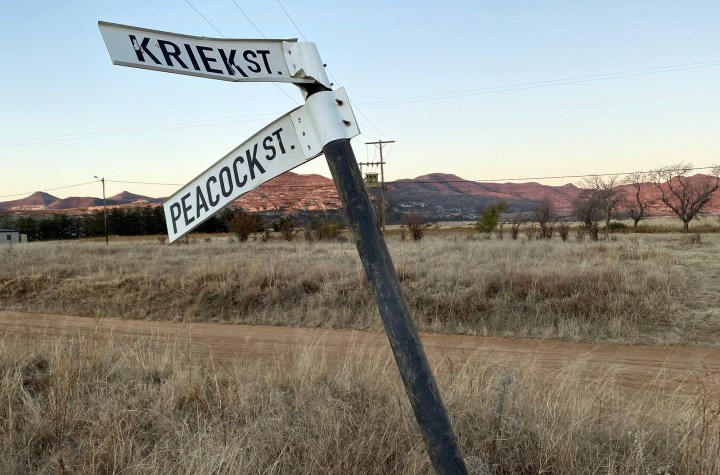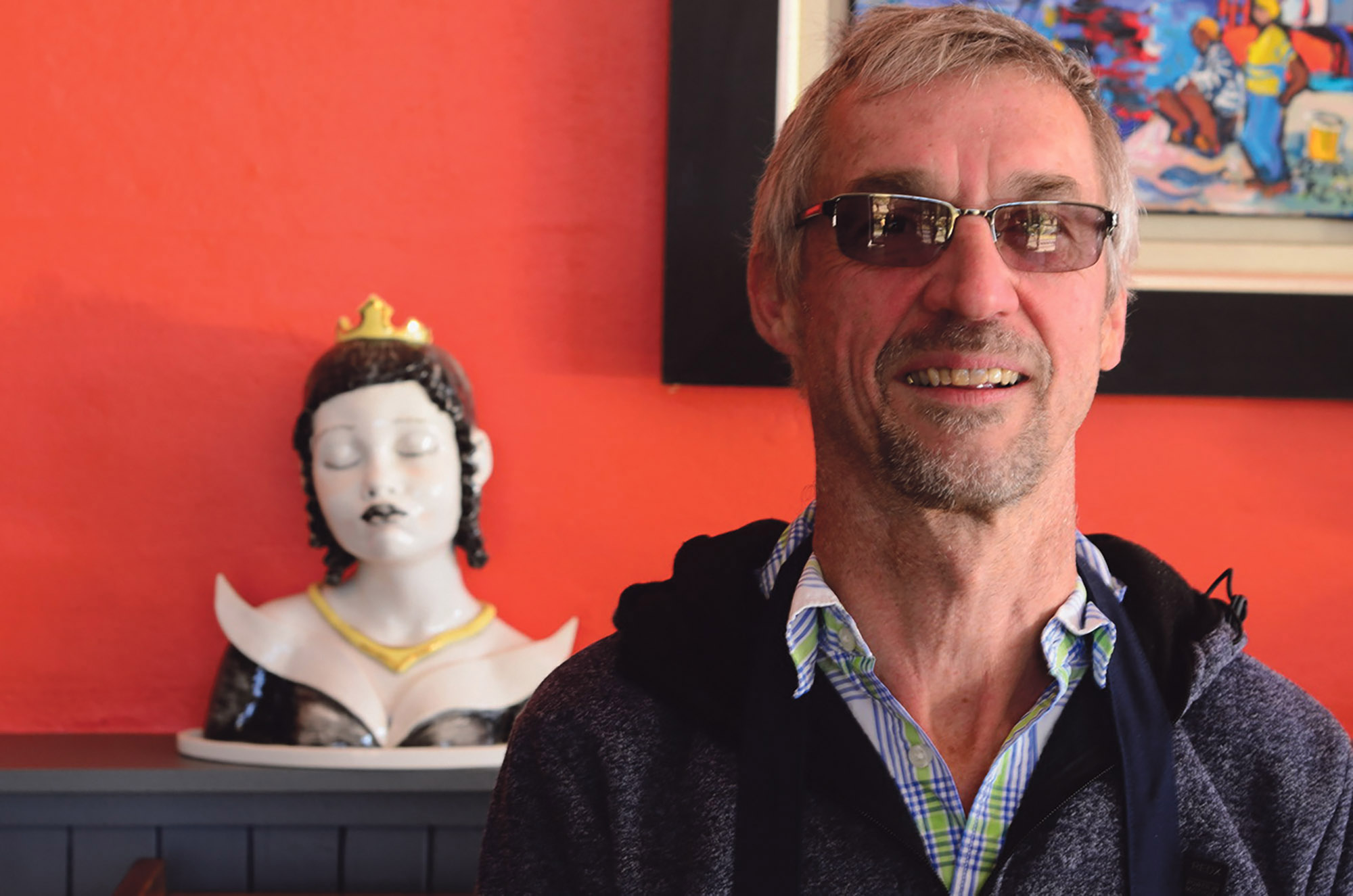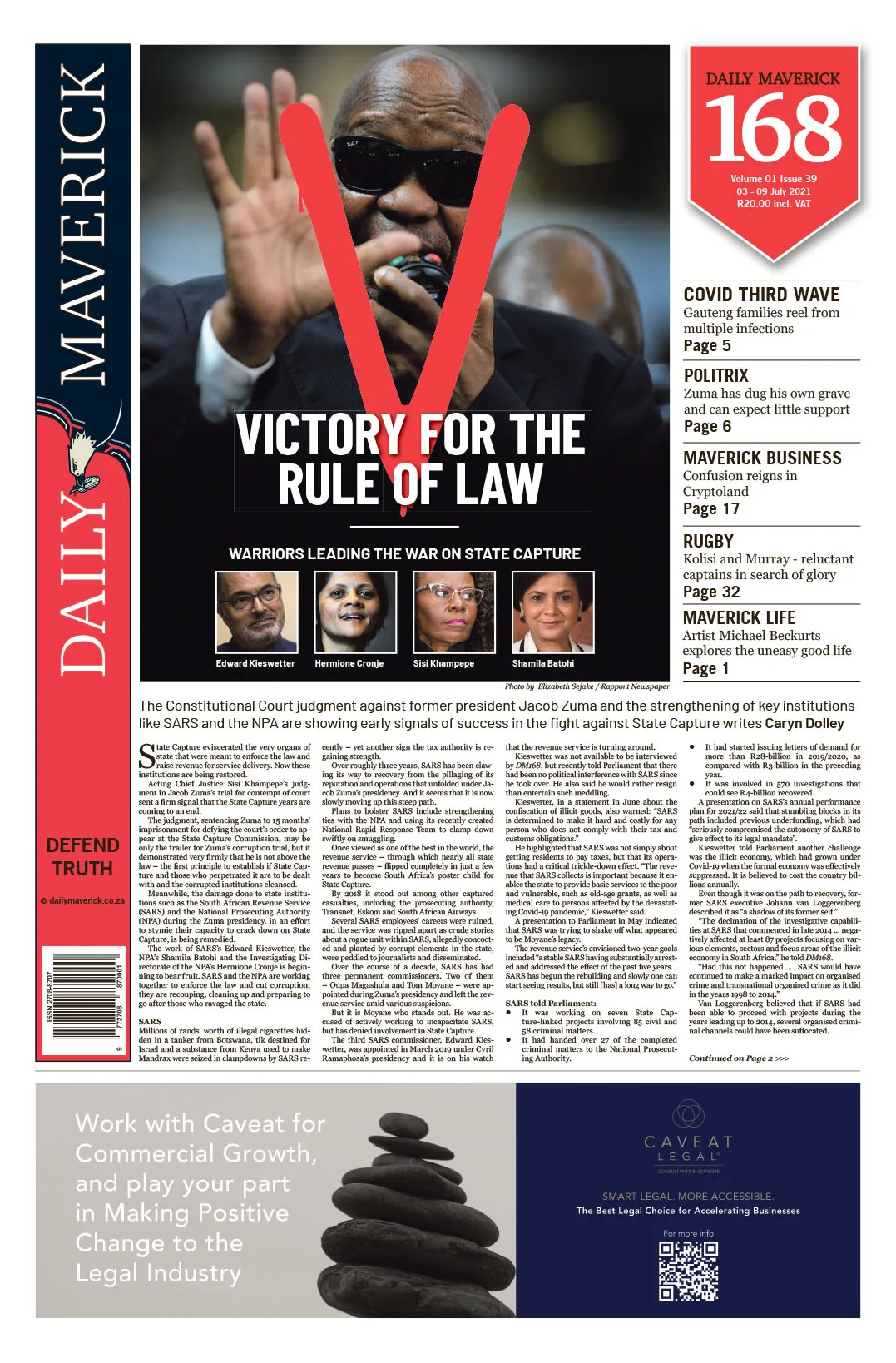DM168 POLITRIX
Innovative residents of a small town in the Free State have big solutions on service delivery

Inefficiency and beauty have become bedfellows in the lesser known town of Rosendal with that favourite South African maxim of ’n boer maak ’n plan.
First published in the Daily Maverick 168 weekly newspaper.
Any talk of the Free State province these days inevitably revolves around suspended Premier Ace Magashule, misappropriated funds and government corruption.
Many forget that the eastern part of the province, bordering Lesotho, with its weather-sculpted rock formations and quaint country villages such as Clarens, is one of the more beautiful parts of South Africa.
Inefficiency and beauty have become bedfellows in the lesser known town of Rosendal with that favourite South African maxim of ’n boer maak ’n plan.
“We get no services here,” says Hennie Burger, a former Pretoria banking consultant who now owns Oppidam, a coffee shop that faces a downhill slope to a dam, with the eastern Free State mountains behind.
“Many people have sunk boreholes to get decent water. We lose electricity every day. Not many have done solar because of the cost and a few live off generators,” Burger says. “Others have tantrums, which really doesn’t help.”
A few streets away from Burger’s house lives Charmaine Gallon, a picture-framer who runs a feeding scheme for children in neighbouring Mautse township, across the potholed R70.
Gallon says that while Mautse’s refuse collection is dismal, with a few skips instead of the bins outside houses that town residents (and most of us) are used to, it has more reliable electricity.
Service delivery challenges
Ironically, this is because Mautse is powered directly by Eskom, whereas Rosendal’s power is sourced from Eskom via the Rosendal municipality.
Community activist Lerato Mosala confirms Mautse faces fewer challenges with electricity than the town across the road, but says Eskom’s inefficiencies nevertheless have a domino effect on Mautse.
“If there is a power failure in Bethlehem, like with load shedding, we don’t get water.”
While chuckling wryly about the state of the roads, Mosala says inconsistent water supply is the main service delivery challenge. He laughs when I mention the “honeysuckers”, the sewage trucks that collect the sewage from some of the older properties in Rosendal, such as Burger’s place.
“We don’t have those; we are connected to the sewage system,” he says.
Power and the pizza
An exasperated Yolanda Marais, owner of Yolla’s, in the same street as the Nederduitse Gereformeerde Kerk (NGK) and the only bar in town, says her place is connected to the sewage network, but it’s the regular electricity outages that are so frustrating.
“Thursday nights are our pizza nights. Selling 40 to 60 pizzas, those are my cash-flow nights, which give me money to buy stock for the weekend. Yet the electricity always goes off.”
Rosendal has a population of roughly 90 residents, meaning Yolla’s and the other two or three restaurants need every beer, coffee or breakfast sold to survive. Business survival requires a constant power supply.
“Electricity is a struggle as technical skills are thin,” says Douglas Mason, chair of the Rosendal Town Committee.
Far from his native Canada and a naturalised South African resident of Rosendal for six years, Mason is a contributor to The Economist magazine. He echoes concerns about the water supply.
“Our water comes via a pipeline from Lesotho via Bethlehem. It cost R26-million to get [the pipeline] the last 30km from Paul Roux to Rosendal. That was completed four years ago.”
He speaks of a “complex system with difficult electronics” that leads to the frequent interruptions in water supply throughout the Bethlehem-based Dihlabeng Municipality. Mason explains that Rosendal is just one of various towns serviced by the large municipality, which ranks among South Africa’s top 10 dysfunctional municipalities. But that’s where Rosendal’s similarity with many failing municipalities seems to end.
Working together
Mason says that it’s advantageous that Rosendal is 70km away from the municipal hub in Bethlehem.
There is, he says, a certain level of autonomy that can be exercised by the 40 employees of the local municipal branch office in town. He stresses the importance of not “being sucked into the pit” that characterises Dihlabeng.
It was this local office that the town committee contacted about service delivery issues about three years ago.
“It was done in a respectful manner,” Mason says. “We simply asked if the community could find ways to assist, and that there was much to gain from working together and that we were not trying to tell anyone how to do their job.”
It’s instructive to hear this Canadian correspondent-cum-chair of a rural Free State town committee speak of how the committee had to win over the trust of the municipal staff.
“Frankly, there are legacy issues in this country around who does the complaining and who has to listen to it.”
Happily, in a context where court action seems to be the knee-jerk, go-to solution to any challenge, whether instituted by concerned citizens demanding action or municipalities defending the indefensible with taxpayers’ money, the response from the municipality to the committee’s offer was positive.
Two working groups – water, electricity and sanitation; and parks – were set up between Dihlabeng’s local staff and volunteers, who meet every two months or as often as needed.
Progress
“From this, we have learnt a lot more about how the municipal systems work and what the challenges are. It has not solved the problems but it has made dialogue and some progress possible,” Mason says.
That progress has manifested in the attitude of the Rosendal community.
A volunteer committee was set up that raised R500,000 and fed, at its peak, 1,500 people a month for seven months during the Covid-19 lockdown, Mason says.
The largest single donation was from the local Rosendal NGK. Mason speaks of the need to look past stereotypes and that, from his experience, “it is the farmers and the local Afrikaners who are often the strongest and the first to come forward when help is needed”.
He says the town committee has planted trees along the main streets, erected “nicely designed signs” at the entrance to Rosendal and to Mautse, bought rubbish bins and is repairing the local cemetery.
Wilfred Sempe, the deputy principal of Taung Secondary School, says the committee funded the repair of 90 broken windows at his school.
Lerato Mosala confirms Mautse’s good relations with the town committee: “We understand there may be challenges at the municipality, but we don’t want to blame people; rather come together and make it work.”
Mason says the town has “virtually zero crime”, and boasts that Rosendal SAPS – under the command of Johanita Lombard, who is fluent in both Afrikaans and Sesotho – must be the best station in the Free State.
“We have little crime for one very good reason: we all know each other. For crime to work, it has to be anonymous. I cannot rob you because I know you. People come to my door every day. They know me by name, and I know them.”
When I contact Lombard to ask about the state of the municipality, she reminds me that SAPS interviews have to be conducted via police headquarters in Pretoria (with someone who’s probably never heard of Rosendal).
Multicultural recipe
From the books on the shelf in the heritage guesthouse Mason owns in town, it is clear this community builder takes a deep interest in this part of the eastern Free State, his adopted home.
For Mason, it’s the mix of peoples that makes it work. “There are very distinct groups that must get along together; not one of whom is dominant.”
He refers to white farmers as the main employers, and middle-class people from the township employed as police, teachers and municipal employees.
He says “legacy Afrikaners” from farming stock are now urban and work at small business and blue-collar occupations.
There’s also a community of relatively newer outsiders – “creatives who have migrated from the cities over the past 20 years and even a few foreigners”. (Mason is one of three Canadians in the small town.)
Rosendal also has a sizeable gay community – something that’s not, as Mason says, “a prominent demographic” in most Free State towns.
“All of these groups – Sesotho, Afrikaner, English – have to get along.”
And so they make life work.
“We’re on a farm outside town”, says Yolla’s Marais. “When we run out of water at the restaurant, my husband brings water. He brings it with a firefighter truck and fills the tank.”
Burger says that, despite the frustrations, he couldn’t be happier. “Oh, I get the moer in. But looking beyond that, this is the realisation of something that I didn’t really believe existed. I’m very happy.” DM168
This story first appeared in our weekly Daily Maverick 168 newspaper which is available for free to Pick n Pay Smart Shoppers at these Pick n Pay stores.






















 Become an Insider
Become an Insider
Congratulations Rosendal. Coming together, looking at what can be done to make things work. A practical, non political approach where those affected by a decision are involved in making it. We could do worse than apply some of these practical, common sense driven ideas across South Africa. Just about everywhere, local Government whether run by DA, EFF, or ANC it is about politics first. In fairness the DA is the best of a bad lot, but still way off how service delivery should be managed. The Auditor General will find Rosendal interesting. After years of reporting to Government and repeatedly reporting the deficiencies in municipalities/Metros to which the response is just more political chat shop, we see an approach that works. Is it really so difficult to apply management basics to service delivery that rate payers and tax payers are funding! Towns and cities across the globe have been applying these basics for centuries. Apparently such common sense is beyond a South Africa governed by the ANC.
I do think that there is a giant gap between the ANC service delivery which is near nob existent, and the DAs service delivery (with very few exceptions which mostly can be chalked up to previously being ANC wards)…is there room for improvement? How much of this is hampered by national legislation and the ANC itself?
A feel good story,
It is not all doom and gloom
Thank you